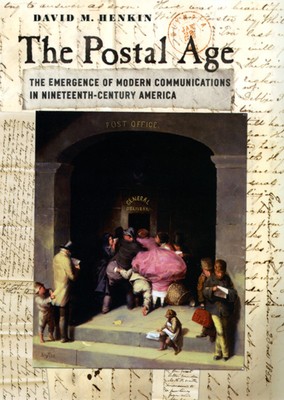
- We will send in 10–14 business days.
- Author: David M Henkin
- Publisher: University of Chicago Press
- ISBN-10: 0226327213
- ISBN-13: 9780226327211
- Format: 16.5 x 22.7 x 1.5 cm, softcover
- Language: English
- SAVE -10% with code: EXTRA
Reviews
Description
Many of us may not realize that what we now call snail mail was once just as revolutionary as e-mail and text messages are today. As David M. Henkin argues in The Postal Age, a burgeoning postal network initiated major cultural shifts during the nineteenth century, laying the foundation for the interconnectedness that now defines our ever-evolving world of telecommunications.
This fascinating history traces these shifts from their beginnings in the mid-1800s, when cheaper postage, mass literacy, and migration combined to make the long-established postal service a more integral and viable part of everyday life. Through original correspondence and public discussions from the time period, Henkin tells the story of how Americans adjusted to a new world of long-distance correspondence, crowded post offices, junk mail, valentines, and dead letters. Throughout, The Postal Age paints a vibrant picture of a society where possibilities proliferated for personal and impersonal communications."The Postal Age is engagingly written, rich with anecdotes and observations that dramatize and illuminate the manifold facets of 'postal culture' in the antebellum United States. . . . a nuanced view of the complicated relationships between technologies and systems and social forms. The Postal Age is a major contribution to American social history and to the history of communications in general."--Geoffrey Nunberg, author of Going Nucular: Language, Politics, and Culture in Controversial Times
EXTRA 10 % discount with code: EXTRA
The promotion ends in 18d.04:37:33
The discount code is valid when purchasing from 10 €. Discounts do not stack.
- Author: David M Henkin
- Publisher: University of Chicago Press
- ISBN-10: 0226327213
- ISBN-13: 9780226327211
- Format: 16.5 x 22.7 x 1.5 cm, softcover
- Language: English English
Many of us may not realize that what we now call snail mail was once just as revolutionary as e-mail and text messages are today. As David M. Henkin argues in The Postal Age, a burgeoning postal network initiated major cultural shifts during the nineteenth century, laying the foundation for the interconnectedness that now defines our ever-evolving world of telecommunications.
This fascinating history traces these shifts from their beginnings in the mid-1800s, when cheaper postage, mass literacy, and migration combined to make the long-established postal service a more integral and viable part of everyday life. Through original correspondence and public discussions from the time period, Henkin tells the story of how Americans adjusted to a new world of long-distance correspondence, crowded post offices, junk mail, valentines, and dead letters. Throughout, The Postal Age paints a vibrant picture of a society where possibilities proliferated for personal and impersonal communications."The Postal Age is engagingly written, rich with anecdotes and observations that dramatize and illuminate the manifold facets of 'postal culture' in the antebellum United States. . . . a nuanced view of the complicated relationships between technologies and systems and social forms. The Postal Age is a major contribution to American social history and to the history of communications in general."--Geoffrey Nunberg, author of Going Nucular: Language, Politics, and Culture in Controversial Times


Reviews